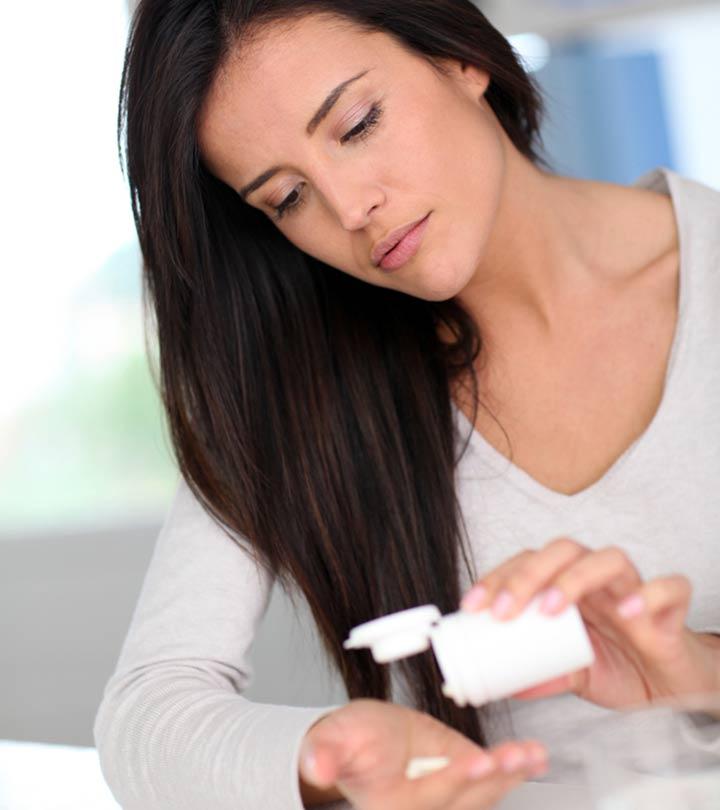Aspirin For Acne: Does it Really Work?
Research shows this drug may help skin issues like vitiligo, swelling, and inflammation.

You might have popped aspirin to get rid of that throbbing headache, cold, and fever. However, do you know that you can also use aspirin for acne? Applying crushed aspirin to the breakouts is a common home remedy. However, does this practice has any scientific merit? Does topical aspirin heal acne or reduce inflammation? This article attempts to explore the truth behind the claims. Read on.
In This Article
Aspirin: Does It Has Any Role In Dermatology?
Aspirin is used as an analgesic for relieving pain. However, with time, it has evolved from its traditional role as a pain reliever and become a drug that has a wide range of applications.
In dermatology, aspirin is used in off-label and unapproved ways. It is beneficial in the treatment of Raynaud’s phenomenon, erythema nodosum (a type of skin inflammation), vitiligo, postherpetic neuralgia, skin changes caused by niacin, sunburn reaction, mild type 1 lepra reactions, and an itchy skin condition associated with polycythemia vera (1).
Another study found that topical application of aspirin could help reduce histamine-induced swelling and redness. The study involved 24 patients with skin rashes caused by sodium lauryl sulfate (SLS) (2).
Therefore, aspirin, when used both orally and topically, can help control the symptoms of several skin conditions. But, is it equally effective on acne?
Aspirin For Acne: Is It Effective?
So far, there is no scientific proof that aspirin can reduce acne.
So why do people use aspirin for acne? The idea behind using aspirin for acne stems from the fact that aspirin contains acetylsalicylic acid. Salicylic acid is a popular topical medication for acne. Acetylsalicylic acid is a synthetic derivative of salicylic acid. It is created by a chemical reaction between salicylic acid and acetic acid (3). They may sound similar, but aspirin is not the same as salicylic acid and vice versa.
However, many people who used crushed aspirin on acne, especially inflammatory acne, have seen results. How is it possible?
Inflammatory acne is caused when your pores are clogged by dead skin cells, sebum, and bacteria. Once these pores are unclogged, the infection disappears, and the inflammation reduces. Aspirin is mainly used for reducing inflammation, but its efficacy in lowering acne-related inflammation is not known.
The main idea behind using aspirin for acne is to use acetylsalicylic acid – the way salicylic acid is used – to treat acne. Sometimes, it works, and sometimes, it doesn’t. Aspirin helps dry out the inflammation, which could clear the infection and reduce acne.
Although clinical studies are showing the efficacy of aspirin in reducing skin inflammation related to multiple conditions, there’s no scientific evidence to support this popular DIY remedy for acne. If you still want to try using aspirin to treat acne, we are here to help you.
Check out the next section.
How To Use Aspirin For Acne
There is no specific way to use aspirin on your face for acne. As it is a home remedy, there is just a general method of using it. However, you can add a few ingredients to modify it according to your’s skin’s needs.
To use aspirin:
- Crush a few aspirin tablets in a bowl.
- Add enough warm water to create a paste.
- Once you get the desired consistency, use the paste as a spot treatment.
- Apply the paste on the inflamed area and leave it on for a maximum of 15 minutes.
- Wash it off with warm water.
- You may follow it up with a moisturizer.
To this mixture, you may add:
- Aloe vera gel – It helps reduce inflammation when applied on the skin (4).
- Tea tree oil (just a drop or two) – It helps in treating mild to moderate acne (5).
- Witch hazel – It has anti-inflammatory properties that help soothe acne (6).
These ingredients can help clear the infection and reduce acne. You can add them to the aspirin and water paste and use it as a spot treatment. You can repeat the process once every day until the infection has cleared.
There are several precautions that you should follow when using aspirin on your skin as it has certain side effects.
Possible Side Effects Of Topical Aspirin And Precautions
- Aspirin can dry out your skin and may worsen breakouts. Therefore, avoid using too much of it on your skin.
- It may cause skin irritation along with redness and flakiness. Instead of using it all over your face, use it only for spot treatment. Also, follow it up with a moisturizer.
- If you are using salicylic acid or any other acne treatment on your skin, avoid using aspirin. It may dry out your skin further.
- It may increase your skin’s sun sensitivity. Always apply sunscreen when going out in direct sunlight.
- Avoid using aspirin for acne if you are pregnant or lactating.
- Avoid aspirin if you are allergic to Nonsteroidal Anti-Inflammatory Drugs or NSAIDs, such as Advil and Ibuprofen.
Many of us rely on home remedies and quick fixes to heal occasional breakouts. Using crushed aspirin for acne is a widely used home remedy. However, it may not work for everyone, and topical aspirin may also aggravate the inflammation. Therefore, you must be extremely cautious before trying random home remedies for managing acne. Since multiple factors may trigger acne, you must first determine the exact reason. Hence, always consult a doctor to determine the causes of the breakouts and follow the prescribed treatment for better acne management.
Frequently Asked Questions
How long should I leave aspirin on a pimple?
If you use aspirin as a part of a mask, leave it on your pimple for about 15 minutes and wash it off. If you apply aspirin only on the affected spot, you can leave it overnight.
How long do you leave aspirin paste on acne?
It depends on the type of acne. You can apply aspirin paste on pimples and papules for an hour or overnight. But, it may not work on blackheads or whiteheads. Keeping aspirin on your skin for longer may irritate or dry the skin.
Sources
- Aspirin in dermatology: Revisited, Indian Dermatology Online Journal, US National Library of Medicine, National Institutes of Health.
https://www.ncbi.nlm.nih.gov/pmc/articles/PMC4693360/ - Topically applied aspirin decreases histamine-induced wheal and flare reactions in normal and SLS-inflamed skin, but does not decrease itch. A randomized, double-blind and placebo-controlled human study, Acta Dermato-Venereologica, US National Library of Medicine, National Institutes of Health.
https://www.ncbi.nlm.nih.gov/pubmed/12013195 - Aspirin, PubChem, National Center for Biotechnology Information, US National Library of Medicine, National Institutes of Health.
https://pubchem.ncbi.nlm.nih.gov/compound/Aspirin - Aloe Vera: A Short Review, Indian Journal Of Dermatology, US National Library of Medicine, National Institutes of Health.
https://www.ncbi.nlm.nih.gov/pmc/articles/PMC2763764/ - The efficacy of 5% topical tea tree oil gel in mild to moderate acne vulgaris: a randomized, double-blind placebo-controlled study, Indian Journal Of Dermatology, Venereology And Leprology, US National Library of Medicine, National Institutes of Health.
https://www.ncbi.nlm.nih.gov/pubmed/17314442 - Moisturizers for Acne, The Journal Of Clinical And Aesthetic Dermatology, US National Library of Medicine, National Institutes of Health.
https://www.ncbi.nlm.nih.gov/pmc/articles/PMC4025519/
- Aspirin in dermatology: Revisited, Indian Dermatology Online Journal, US National Library of Medicine, National Institutes of Health.












